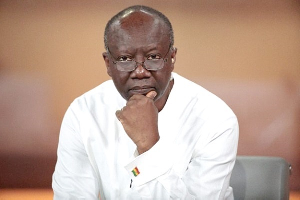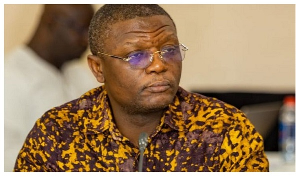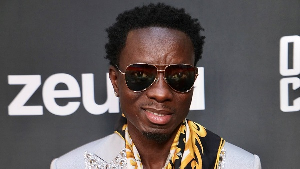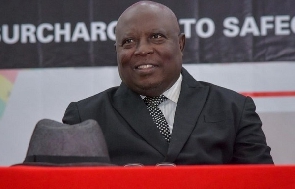Ghana's independence, proclaimed by Dr Kwame Nkrumah in an emotional speech on the eve of the official day of celebration on March 6th 1957 and 113 years after the signing of the Bond of 1844 at Abora by some of our forefathers, who represented us was very significant in many ways. First, it served as a motivating tool for other African countries to maximise their efforts in their pursuit of self-rule. Thus, soon after Ghana's independence, indigenous Africans from the other colonies resolved to break their colonial ties and take control of their own destinies. It also prompted the colonial powers to review the thoughts and ideas they held about the people in the colonies that they controlled from their far away homes. Thus, the colonial powers would once again be faced with the problem of having to abolish the second phase of their desire to enslave Africans. Africans were concerned about the devastating effect on their economies on colonial control. As Nkrumah put it simply, it was also a way of proving to the Whiteman that the African is capable of running his or her own affairs, something that the Whiteman does not seem to believe even as I write.
March 6th 2007 marks the 50th anniversary of Ghana's independence from white British colonial rule. I usually feel reluctant to use the term independence for the mere fact that I have never understood why a country or state would seek to claim ownership of another country or state. This to me reflects a blatant display of civil and military brutality, excessive greed and a false sense of superiority by the dominating and usurping race over the other. In the mid 1940s Kwame Nkrumah was invited by men such as Pa Grant, Kwame Kyeretwie Boakye Danquah (popularly known as JB Danquah),Obetsebi Lamptey, Edward Akufo Addo, William Ofori Atta and Ako Adjei to join the nationalist movement of the then Gold Coast. The aforementioned men were the pioneers of the independence struggle. Nkrumah would later become the leader of the first political administration that replaced the colonial administration.
Pa Grant was a Businessman while the rest were young qualified Barristers and political activists, who questioned and challenged the inequalities created by the British colonial administration.
Ghana’s early leaders were selfless, patriotic, nationalistic and far more modest and transparently honest than the pseudo-intellectuals and deceitful prophets of accountability, who in later years would rule Ghana, thoroughly mismanage it, deceive the people and be unable to hold to their promises. Men like Boakye Danquah and his colleagues including Nkrumah did not focus on acquiring personal property by building or buying houses for themselves. Considering their level of education at the time, if they had thought and acted like some of the politicians who claim to have learnt so much and go round shouting in Mother Ghana now, these people could have partitioned the country among themselves like some so-called socialists have done by taking over state property under the guise of divestiture programmes.
It is also worth noting that the independence struggle affected everyone in the country at the time and many people from both urban and rural areas played significant roles to pave the way for what was eventually proclaimed by Nkrumah. The activities of distinguished men like Nii Kwabena Boni (Osu Alata Mantse), Sergeant Adjetey, Corporal Attipoe, and Private Odartey Lamptey, who led the 28th February demonstrations and who were murdered in cold blood by the British colonial administration together with those of the organisers of the Suhum Cocoa Farmers strike in 1937 deserve recognition whenever Ghana's independence is discussed. It is our responsibility, if we consider ourselves as patriotic Ghanaians, to pass this valuable history on to our offspring. There were also women who catered for these gallant men and they all deserve our unqualified respect.
In 50 years of independence, Ghana has passed through the hands of several leaders, all with very different personalities and temperaments. These include Dr Kwame Nkrumah, Lt. General Joseph Arthur Ankrah, Lt. General Akwasi Amankwa Afrifa, Dr Kofi Abrefa Busia, Mr. Edward Akufo Addo, Colonel (later General) Ignatius Kutu Acheampong, General F.W.K. Akuffo, Dr. Hilla Limann, Flt.-Lt. Jerry John Rawlings, and President John Agyekum Kufuor. A list of Ghana's leaders to date reveals an interesting pattern. At some points in Ghana's political history there seems to have been two leaders or groups ruling. This was evident during Busia's first year as Prime Minister, when there was the three-man Presidential Commission of J.W.K. Harley(the then Inspector General of Police and the architect of Nkrumah's overthrow), A.K Ocran and A A Afrifa, all of who played very active parts in the military coup which ended Nkrumah's leadership. Rawlings, who emerged as a military leader by usurping power from another military leader Akuffo in 1979 and then again re-appeared in 1981 does not seem, from 2001 when Kufuor became President till today, to have come to terms with the fact that he is no longer the leader of the country's government. Unfortunately, there are individuals who hide behind Rawlings to support his behaviour in order to safeguard their soft-earned booty. For the purpose of this article, I will focus on one positive initiative or legacy that many Ghanaians, who are objective, would be able to associate with some of these different personalities who have been at the helm of affairs in Ghana and who have been 'First Citizens'
since the British colonial administrators handed the baton of office to the 'sons of the soil'. Please forgive me if there is something very positive and significant that anyone of them initiated which I have omitted. Remember also that all these people are human and can make mistakes. I do not intend to remind Ghanaians of the negative things. Let us look ahead as the Young Pioneers of Nkrumah's time used to sing, 'Forward Ever, Backwards Never'.
I give Dr Nkrumah a lot of credit for the Accelerated Education Programme, which helped so much to expose Ghanaians - young and old - to the world around us and to equip the citizens to play meaningful roles at home and abroad. The military men who overthrew Nkrumah must also be praised for the nationalisation of Ashanti Goldfields, which I hear led to the fainting and collapse of the then English boss General Spears. Dr Busia must be lauded for initiating the Rural Development Programme and for encouraging indigenous Ghanaians to engage in small-scale trading activities, which were at the time in the hands of immigrants.
General Acheampong must be acknowledged for the Operation Feed Yourself programme and the 'Drive On the Right' a.k.a. Anifa Anifa project. Flt. - Lt. Rawlings deserves mention for the introduction of grassroots politics and the creation of District Assemblies. A very significant achievement by President John Agyekum Kufuor is Open Government and respect for The Rule Of Law.
As we celebrate 50 years of our independence, we have to ponder some of the things we could have done better and use whatever knowledge skills we have acquired to improve upon the cultural, social, economic and political situation of the country to make it an enviable place for future generations.



















